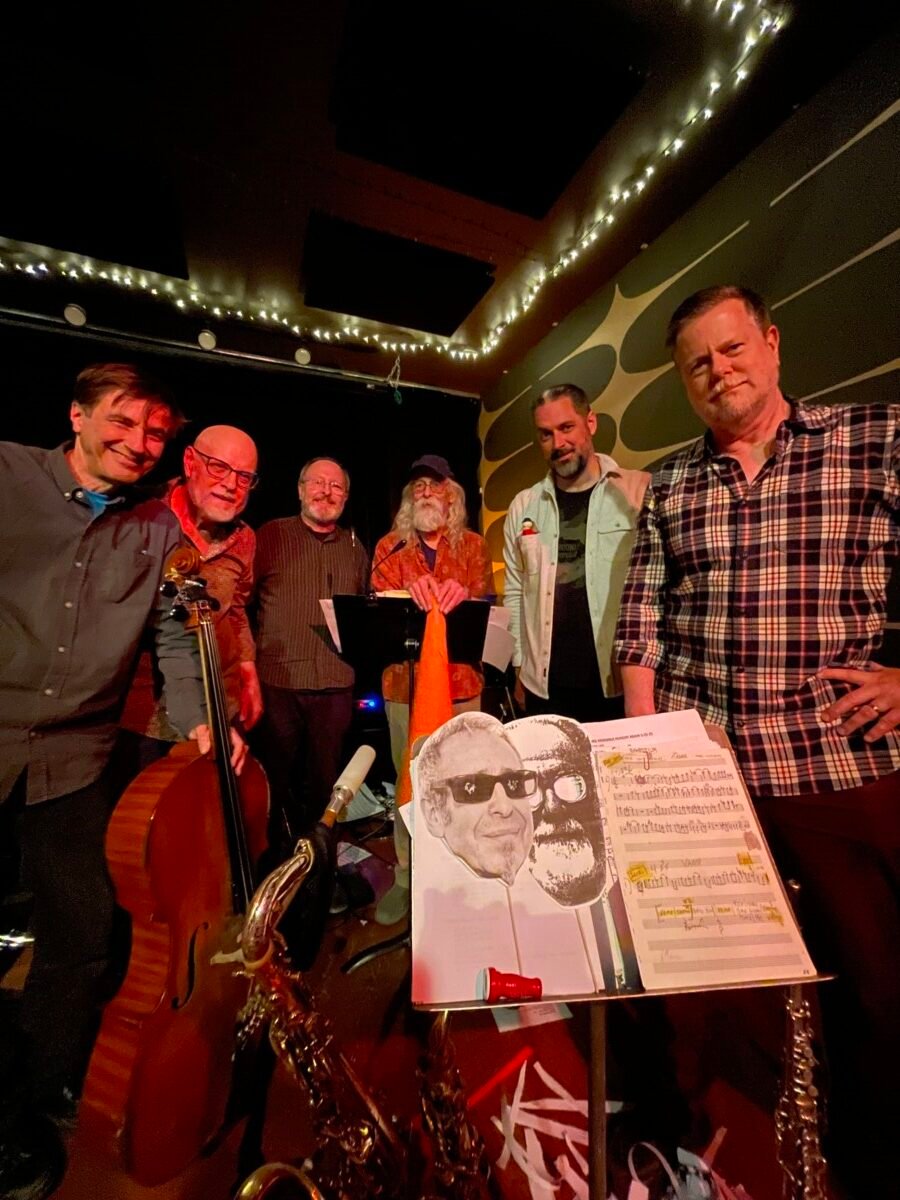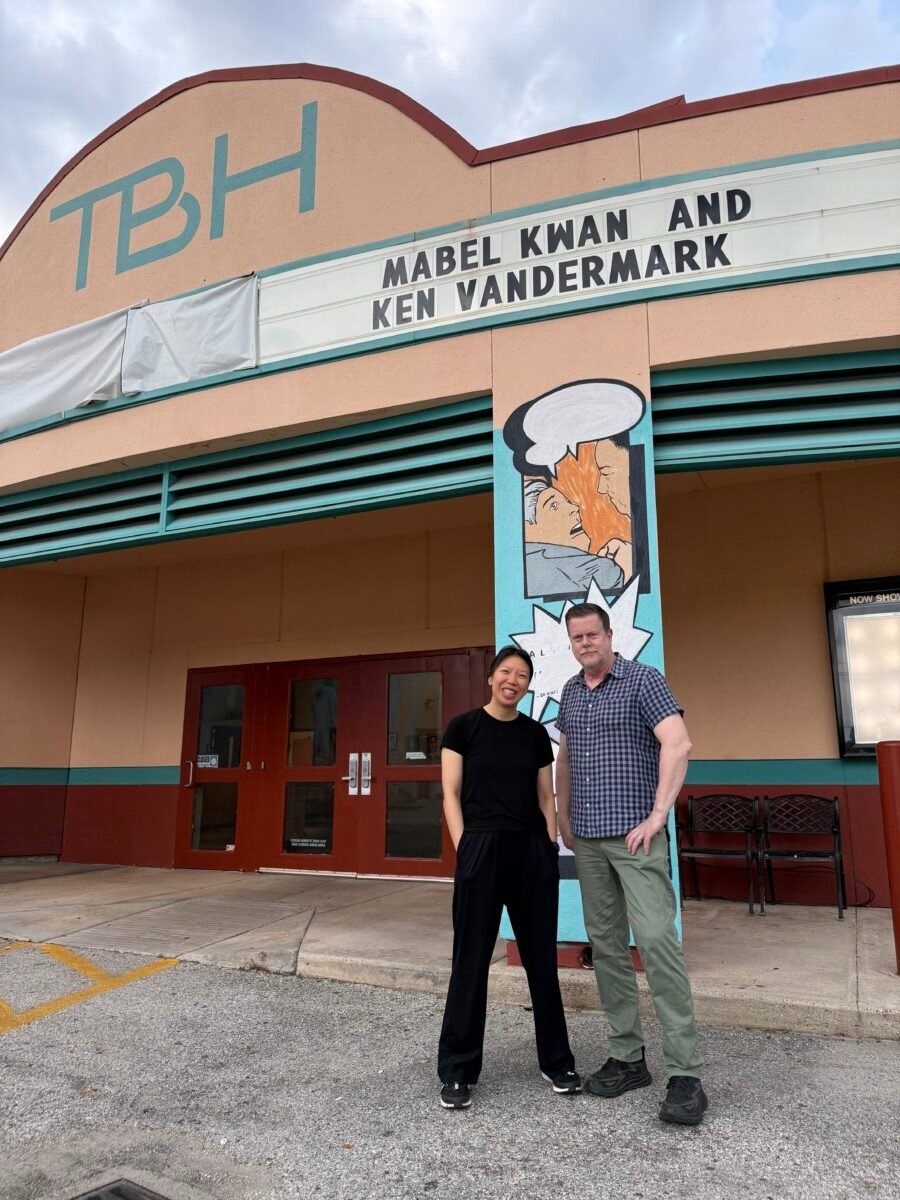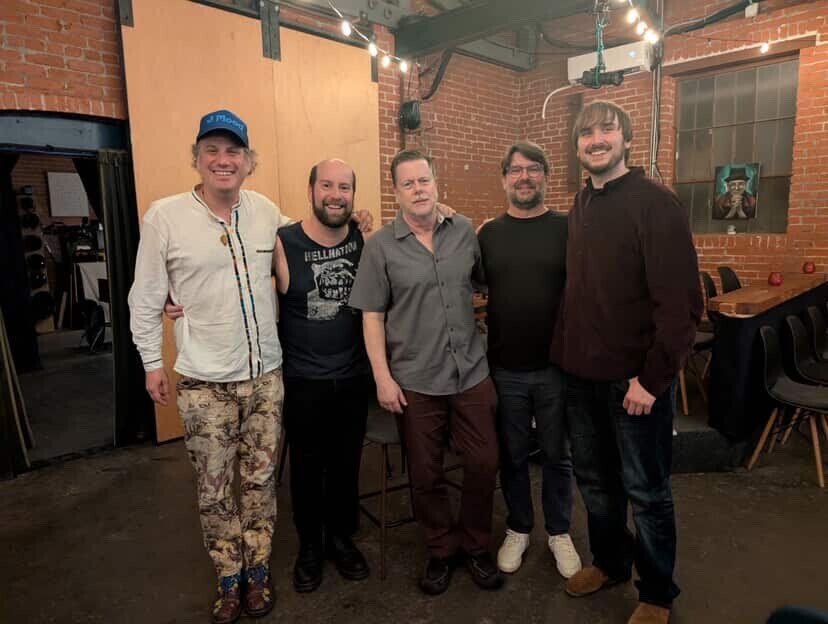After and Before

[NRG Ensemble photo by John Corbett (left to right: Fred Lonberg-Holm, Kent Kessler, Steve Hunt, Brian Sandstrom, Dave Rempis, Ken Vandermark)]
In John Yau’s brilliant book, “A Thing Among Things: The Art of Jasper Johns” (Distributed Art Publishers: 2008), Yau often brings up the idea that Johns flipped the conventional idea of chronology as “before and after” to “after and before”, putting the viewer into a space to experience “now”: after something has taken place and before the next occurs. I have frequently thought about this idea following the back-to-back experience of performing with a version of the NRG Ensemble in Chicago then concerts with Mabel Kwan and the quintet of Kory Cook, Matthew Frerk, Stefan González, Jonathan Horne in Austin.
The show with the NRG Ensemble took place at the Hungry Brain on May 25th and was part of the “Music From Mars” events organized by Steve Marquette and Dave Rempis to celebrate Mars Williams and his creative work on what would have been his 70th birthday. Also included were a presentation of Mars’ long-form piece, “The Devil’s Whistle”, “Mars Williams’ Toy Story” composed by Lia Kohl, and the launch of the Mars Williams archive at Experimental Sound Studio. I left the NRG Ensemble in the late 1990’s and performed with them once after that, for the “Hal Russell Story” performance at Millenium Park on June 15th, 2012.
The music that Mars wrote for NRG which I originally played and recorded with the band, and which I’d perform at the concert on May 25th with Steve Hunt, Kent Kessler, Fred Lonberg-Holm, Dave Rempis, and Brian Sandstrom, was very much driven by the horn parts. Dave and I knew we would need to work on them together in advance of a group rehearsal if the gig was going to be a success. We met in my basement to go over the charts that had been selected for the concert. Not surprisingly, it brought back a lot of memories as we went over the music. At a certain point, after trying to figure out how to play a coda on one of the tunes by listening to a recording of it and hearing how something that sounded nearly impossible to perform was executed flawlessly, Dave asked me how NRG did it. “We rehearsed every Saturday afternoon for years, whether we had a concert or not.” The same was true of the Vandermark Quartet and the Vandermark 5, we had weekly rehearsals, also for years. Many things have changed since the 1990’s, and one of them has been the ability to get a band together on a regular basis to develop material, perform it, and then go back to make adjustments at the next rehearsal, again and again. Everyone’s schedule has become so complicated it literally takes a Google document to coordinate the musicians’ timetables to make performing new work possible.
I knew that performing with the NRG Ensemble again after almost 3 decades and without Mars was going to impact me, and it did. Playing music for an audience- as always- was a completely different experience than rehearsing. During the first set of the concert, the mental and emotional incongruity of watching Dave for all the cues that Mars used to give the band hit me and affected me much more than I thought it would. I have to state that there was no way this concert, and the others that took place during the “Music From Mars” celebration, would have been possible without the work Dave Rempis put into the events; especially for the NRG show where he worked with Brian, Kent, and Steve to select material for the set, then coordinated the rehearsals and gig itself. Dave had to be the point person onstage.
While playing I was also made to realize how far I had moved away from many of the aesthetics I’d explored during the NRG years. The combination of these factors rattled me. I got into my own head, away from the purposes of the music and the reason we were all there- to honor Mars and his contributions to the scene. Luckily, between sets I was able to talk briefly to John Corbett and Terri Kapsalis about my head space. Giving voice to what I was struggling helped align things for me. From the start of the second set and for the rest of the concert I once again understood that I had to play what the music needed, not what I wanted it to be. I found the joy in all of it, cherishing Mars’ memory alongside musicians that had played with him, for a sold out audience celebrating with us.
In the days after the NRG Ensemble show I was focused on preparing for a residency to take place in Austin on May 29th and 30th, but the experience of being so directly confronted by my past and the loss of a close friend and creative partner remained on my mind. Chris Cogburn, who runs the No Idea Festival, initially suggested the idea of me coming to Austin to perform solo and be part of a panel discussion after screening the Daniel Kraus documentary, “Musician”. After discussing the project further, the proposal expanded and turned into a two-day residency that- in addition to the film and panel discussion, and instead of a solo concert- would include a duo with Chicago pianist Mabel Kwan; an open rehearsal and performance by a quintet that would include musicians from Texas- Kory Cook, Matthew Frerk, Stefan González, Jonathan Horne- playing my compositions; and a trio with Stefan and Matthew performing the work of Fred Anderson and Dennis González.

I knew that the duo gig with Mabel on the first night would be fantastic, and it was (we also performed duo on Saturday, May 31st, on a bill that included the trio of Chris Cogburn, David Dove, and Juan García at the Talento Bilingue de Houston). I’d worked with her in a collaboration with Ensemble Dal Niente and for a trio put together by Beth McDonald, and have heard her perform in a variety of contexts. When Chris asked me if there was someone I’d like to invite from Chicago to perform with, Mabel immediately came to mind because of her wide-ranging musical ability and improvisational skill. I relied on Chris to make suggestions regarding the musicians from Texas that I should collaborate with since, though I had met Jonathan and Stefan before, I had not played with anyone based in that area. With Stefan’s assistance, Chris proposed four musicians for a group that would work with my compositions. Because Stefan and Matthew were already working together in Trio Glossia it made sense to have them play with me for the concert of Fred Anderson and Dennis González material.

The musicianship and creative energy of Kory Cook (drums), Matthew Frerk (acoustic bass), Stefan González (vibraphone [drums for the trio set]), and Jonathan Horne (electric guitar) totally blew me away. I expected that they would be skilled players, but there has only been a handful of times in my career when I’ve met a group of musicians for the first time to rehearse with them once, and then completely lift the bandstand in a performance. As mentioned, there was an open rehearsal for the public. This was scheduled at 5pm on Friday, with a break before Mable played a duo set with the bassist, Juan García, followed by the quintet performance. I knew something special was going on when the four other musicians told me that they were going to meet at 1:30pm to get ready for the public rehearsal session. As stated above, scheduling rehearsals has become something of a Tetris game and musicians who propose to do extra work on their own volition can be a rarity.
I sent recent compositions of mine to the players from Texas in advance, pieces that I thought would be quick to learn because limited time we would have together but that still pushed beyond a simple head-solos-head form. Three were from the Pivot recording session that took place in December of last year with Mats Gustafsson, Tomeka Reid, and Chad Taylor: “Blowing Out From Chicago”, “Unmeasured Mile”, and “Popular Music Theory”; a fourth was selected from the collaboration I had with the Macedonian trio Svetlost and Paal Nilssen-Love in April, called “Room 1520”. When I met with the other musicians it was clear that they had all worked on the material ahead of time, also unusual in my experience. This sped up the learning process greatly. In addition, the skill they all possessed was more than technical, it was interpretive- they didn’t just play the music properly, they brought it to life.
When the quintet got together to work on the compositions in front of an audience, though the improvisations were not concert length, the feeling of true communication between all the players was already incredibly strong. A fact made truly impressive because, not only had I not collaborated with any of Texans before, some of them hadn’t performed together either. Even if the energy of the playing at the open rehearsal was intense, it did not hold a candle to that of the concert. From the first moment the music was charged forward and in constant alignment. At the end the first piece, “Blowing In From Chicago”, there was a silent pause from the audience which was immediately followed by unrestrained cheers and applause. Something exceptional was happening, I already knew getting together with this crew of players needed to happen again.
On the first night, before Mabel and I performed, “Musician” was screened. I don’t think I’ve seen Daniel Krauss’ film since it was released in 2007 and I was struck by how much the work of being part of the music scene has changed and stayed the same since then. Communication done with an old school answering machine, simple cellphone, and Blackberry (now it’s all email, social media, and smartphones); getting in the van and loading lots of merch, instruments, and gear; months on the road at home and abroad with multiple bands, collaborating with musicians scattered across the globe; the successes achieved and the toll it takes… At the conclusion of the residency, I realized something. Here it is now, decades after the NRG Ensemble and the MacArthur funds, and before what can be next: like more work with this Texas quintet, performances with Mabel Kwan, the Edition XL group, the project with Erez Dessel, Lily Finnegan, Beth McDonald, and John Yau…
Yau’s book on Jasper Johns helped me understand it, where I am. Now. My thanks to Chris Cogburn and No Idea, John Yau, Daniel Kraus, and to all the musicians involved.